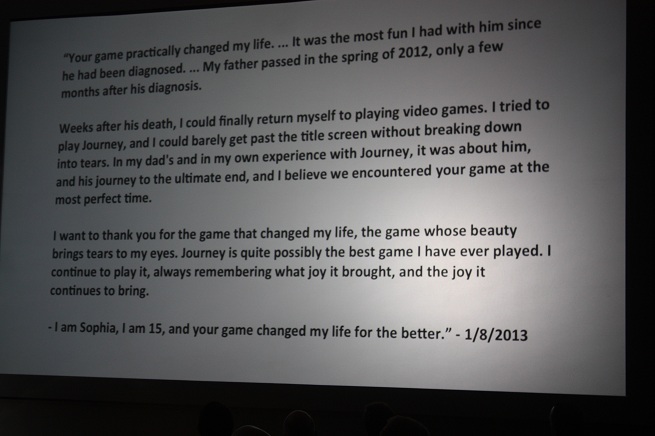LAS VEGAS — Jenova Chen got a letter from a 15-year-old girl named Sophia last month. She said that she had played Journey with her father before he died from an illness, and the game had changed her life.
“That letter made it all worth it,” said Jenova Chen, the cofounder of Thatgamecompany, which won game of the year last night for Journey at the DICE Summit. It’s a PlayStation Network downloadable title that’s unique among video games for its poetic ambiance and lack of violence and dialogue.
Chen talked about Sophia’s letter (attached at the end of story) at the close of a talk on emotions in games.
 Many participants, like Shuhei Yoshida, the head of Sony’s worldwide game studios, said that Chen’s talk was the highlight of the event and that it was more like an authentic confessional. Chen got a roar of applause when he was finished.
Many participants, like Shuhei Yoshida, the head of Sony’s worldwide game studios, said that Chen’s talk was the highlight of the event and that it was more like an authentic confessional. Chen got a roar of applause when he was finished.
He and his team also got a roar of applause when they won “game of the year” at the game industry’s equivalent of the Oscars, the peer-voted DICE Awards.
Journey, like Thatgamecompany’s Flower before it, was a rarity in a game industry full of violent content. The game depicts a being’s lonely journey to the top of a mountain and the spiritual change that takes place along the way. I played the game with my three daughters several times all the way through — something they’ve never done with a PlayStation 3 game (except Flower). Journey has no weapons or words, but it is full of emotion.
Journey’s unique in a business that has every kind of shooter game, but very little content such as romantic comedies, which are so plentiful in movies. The game was all the more remarkable in that it was made in about three years with a team of 13 people; major game projects typically employee a hundred or more.
In his talk and a subsequent interview, Chen revealed that not only is Journey a metaphor for life and death, it is also an apt description of the struggle that Los Angeles-based Thatgamecompany went through. During the process of shipping Journey, Thatgamecompany went bankrupt and had to idle its staff. If the team had shipped on time, they wouldn’t have had a polished game. It was a tough decision to delay it.
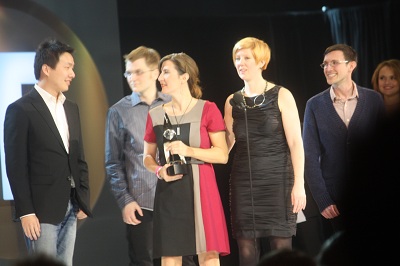
Chen said that the team was supposed to ship a year earlier than it did, and it had run out of money. The staff got by on half salaries for six months. When they shipped to Sony in January, the coffers were dry. The company ran out of money, gave everyone three-week vacations, and no one expected to come back.
Chief exec Kellee Santiago (in red) and designer Robin Hunicke (in black) both left the company. Chen stayed on in a minimal capacity. Eight of the company’s 13 employees eventually moved on to do something else.
But the story has a happy ending. Journey went on to become the best-selling PlayStation Network game of all time. Chen doesn’t know for sure, but presumably it will earn royalties. And Mitch Lasky, a general partner at Benchmark Capital, was so moved when he played Journey that he started talks to invest. Thatgamecompany raised $5.5 million, and it committed itself to making cross-platform games that deliver human emotion to a wider audience.
Last night, Chen won the ultimate vindication for delaying the launch of Journey. The company won eight awards out of 11 nominations, including the Best Game Director award for Chen and Game of the Year. We talked to Chen in an interview, and here is an edited transcript of the talk.
GamesBeat: Maybe you want to start with the ending of your talk, with this letter from Sophia and what it made you feel when it arrived.
Jenova Chen: Over the course of last year, we’ve been getting this kind of mail pretty consistently. I was quite moved by it early on. I think there were more than five or six people who’ve lost their family members. They contacted us to talk about how they were reminded of their passed-away family members in the game. By traveling with them, they were able to settle with their grief. Most of the mail was just along the lines of “It’s a wonderful game! I just wanted to tell you how great it is.” But very so often there’s a message that touches me, and I have to write back. I have to share it with everyone who worked on Journey. This happened to be one of the most recent ones. It’s January, so I still remember it.
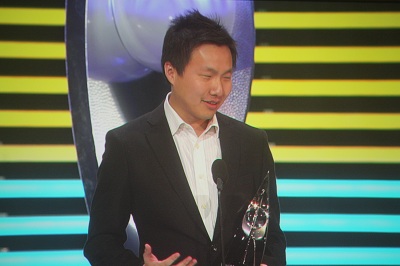 GamesBeat: Did you have a conversation with her then?
GamesBeat: Did you have a conversation with her then?
Chen: She’s 15. I wrote back to her. I think my e-mail was probably too theoretical, talking about how it’s not the worst thing, how life will be better. I didn’t hear back from her. I shared the e-mail with Sony, though. A lot of people were moved by it. They wanted to send her a poster or the collector’s edition of the game. I think that’s what happened.
GamesBeat: As you said, that’s exactly the kind of target that you had in mind for the emotional reaction to the game.
Chen: The mission statement of Thatgamecompany, after all these years, is that we want to create timeless interactive entertainment that makes positive changes to the human psyche. If our games can help people, that’s the best reward we can get. Hearing that girl saying the game helped make her life better is all the hard work paying off.
GamesBeat: You described Journey as very hard to make. I don’t know if you went as far as saying you ran out of money. Just how dire was the situation?
Chen: Near the end, around the launch of Journey, quite a few members of the team left TGC. It’s not because they chose to. We ran out of money. Most of us were paid at half salary for almost half a year. We finished Journey in January, but it wasn’t going to come out until March. There was this middle period where we didn’t know what was going to happen. Nobody knew what was happening next. Would we take a publishing deal? Would we get investment?
All this uncertainty forces people into action. We decided as a group that we would give everybody three weeks’ vacation, and then during the vacation, we decided that it was probably better to let the people who wanted to move on do so. We basically laid off all the employees. We gave them all severance, spreading all of our money around. We were ready to take down the company.
We entered this minimal state, basically just a bunch of guys waiting around. After we laid off most of the people, Robin told us that she had another opportunity. She didn’t know what was going to happen to her if she stayed at TGC, and her friends at Tiny Speck needed help. So she decided to move on.
Some of the employees who’d left eventually came back to TGC. They were like, “We don’t know what’s going to happen, but we still need a job.” We decided to continue TGC once we figured out all of these things. Some of them had already found jobs elsewhere, but they eventually came back. It was kind of dramatic.
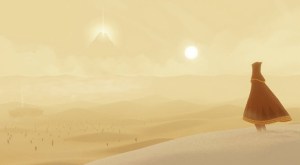
GamesBeat: It sounds like you had a good outcome, though. The game must have sold very well.
Chen: It helped to ease the pain at the end there. It’s funny. If Journey had shipped the same month that we finished it, we wouldn’t have had to go through such a painful transition. I don’t think it’s a bad thing, though, because in that transition, we hired a bunch of new people. They were great additions to the team. Nothing truly bad happens. There’s always good and bad in any changes.
GamesBeat: I don’t know how quickly the sales come back to you. Did it take a while? But you did raise money, too.
Chen: Right. I don’t know if you’ve heard anything about Sony’s payment schedule. It’s delayed by three months. I don’t get the sales data until the next quarter, either. So I know Journey’s sales picked up at Christmas, but I don’t know how much it sold. Maybe I’ll know by February? Honestly, I don’t know how much Journey has sold at this point. But I know we broke even on it.
GamesBeat: What came first: The sales revenue or the investment?
Chen: The first thing we needed to do was pay back the investment Sony put in. Then we could start bringing in the money from Journey. As far as I know, we broke even, but the last thing I saw was just breaking even. We don’t know how much Journey has actually generated in terms of revenue.
So if we didn’t have investment, we were in debt. We were in debt for quite a few months. It’s stressful when you run a company. At the time, I was kind of grumpy. We put in all this hard work, I poured my heart and soul into this, and our company is bankrupt. Why? We didn’t make a bad game. Our game was a top-selling game on the PSN. It was a time when I had to do some soul-searching. “Why am I doing this?”
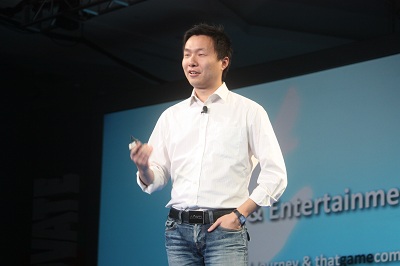
GamesBeat: I guess that’s what you guys meant when you said when you were going through a journey yourselves.
Chen: The whole development was very emotional. The climax was the launch of Journey. Everybody learned a lot from the game.
GamesBeat: Would you have been OK if you’d shipped a year earlier?
Chen: I’ve been thinking about that. It probably would have been an OK game. Some people would like it. Some people wouldn’t. People would have thought of it as more like an artsy game or a student game. But they wouldn’t have been touched in that overwhelming manner. Only when it really touched people did they start to look at it in a different light. So I might have regretted it.
GamesBeat: During that last year, did you change Journey from top to bottom? Did you change it dramatically? Or was it a matter of finishing what you had planned to do?
Chen: I’m a perfectionist. I know what the game needs to be. I have to struggle with forces from everywhere else, though. We don’t have the money or we don’t have the time that can allow us to do it. It’s mostly a struggle with the confidence of the team. It was difficult. Everybody loved the project so much that they were able to handle the stress.
GamesBeat: There should be some way that the game industry can finance something like this, don’t you think?
Chen: Yeah. A while back, I did a big talk about the White House meeting the game industry. Talking about violence and how maybe it’s time to suppress violence in games. There’s nothing wrong with violence. It’s in every other medium. What needs to happen is that there needs to be some help for better-quality games. In Canada or France they have grants for the arts.
 GamesBeat: Did you guys try to find money like that?
GamesBeat: Did you guys try to find money like that?
Chen: Sony was very gracious. We extended the schedule from two years to two and a half, and then from two and a half to two and nine months. Eventually, we were still late. They could tell that the game needed more polish. At that point, they said, “Can you guys finish it?” We thought we could. But paying for several months of salary for 13 people is still quite a lot of money. This was happening while we were looking for our next deal.
Our collaborators at Sony could see that the game was progressing pretty smoothly. There were no surprises there, nothing we couldn’t figure out. It was getting better every day. Most of the challenge was coming from the other end. What would be the future of the company? Who would we work with? How many people would stay in the company if we went with a particular publisher? How many wouldn’t stay if we went a different way? That was the most difficult time for us.
GamesBeat: Were you worried that Journey would never ship?
Chen: I didn’t worry about that much, because Sony had put in so much money already. They wanted to ship it. At the end I just felt that if there wasn’t enough put into it, that the game wasn’t going to be great.
GamesBeat: You got 11 nominations here. That’s pretty great.
Chen: I want to thank whoever nominated the game. It’s not like we’re a big company. I don’t really know anybody. If people nominated Journey, it’s because they loved the game. If they love what we put our lives into, I really feel grateful.
GamesBeat: I think I learned some things from your talk, like the notion of designing around emotions. Did you do that with every one of your games?
Chen: We did that with Flower. Our two early games, Cloud and flOw, I wasn’t aware that I was creating emotions. It was more of an accident that we stumbled onto some weird feelings. We were just trying to make something new. But starting with Flower and going on to Journey, it was very explicit. Flower was following this exact arc. At the time I hadn’t been exposed to the hero’s journey yet, but the arc is almost identical in terms of the intensity.
 GamesBeat: How did you come up with the idea of a journey up a mountain?
GamesBeat: How did you come up with the idea of a journey up a mountain?
Chen: Do you remember some of the early concept art I showed? The massively multiplayer online concept? I forgot to mention that the goal of all those people in this world is that they’re lost. They’re trapped in the middle of the mountain. There’s this old saying in China. “You don’t see the forest because you’re in the forest.” You have to get out to realize you’re in the mountain.
The idea is that all these people are seeking enlightenment. They want to find the ultimate truth. But it’s vague. It’s a myth. No one knows what that ultimate truth is. Here, it happens to be on the top of the mountain. Everyone’s trying to get there. This concept of getting to a summit was always there, but I wonder why I came up with that idea. I don’t know. It’s a very good giant weenie, to use the Disney term. You need some giant landmark that always guides you when you get lost.
GamesBeat: People interpret it in very different ways. Would you consider it a religious game?
Chen: There were people asking me that at the early E3s. My answer is that I’m a spiritual guy. I grew in an atheist environment in Communist China where I wasn’t exposed to any religion. I’m quite spiritually curious. After I came to the States, and particularly after I read Joseph Campbell’s work, I did a lot of research trying to learn about the nuances and the differences in religions. I could see the common elements.
After I read so much, it felt like it was impossible for me to say that I’m a Buddhist or I’m a Christian, because they’re all the same. I would say that I’m a spiritual person, but because of that, we didn’t want to make Journey particularly Christian or particularly Buddhist or of any particular religion. That’s the greatness of Joseph Campbell’s work. His book, The Power of Myth, shows all these fundamental things that are shared among all cultures. That, to me, is what the truth is. I wanted to make Journey about a truth, about the most fundamental things.
It’s funny. Chinese gamers would say that I’m totally Buddhist, that this is a Buddhist game. Western players think that it’s about Christianity. I think that’s a good thing. People get more out of it if they put themselves into the game.
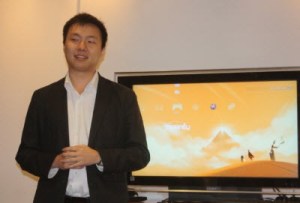 GamesBeat: It seems like if you cut off the ending; before you start again, it almost seems Western. If you start over and go through that reincarnation, it seems Eastern. [Laughs] It’s very open to interpretation.
GamesBeat: It seems like if you cut off the ending; before you start again, it almost seems Western. If you start over and go through that reincarnation, it seems Eastern. [Laughs] It’s very open to interpretation.
Chen: The heaven thing, we were debating. Maybe the heaven thing is too cheap? It’s like giving them a soft, candy-centered ending. The team debated it for quite a while. It was the playtest results that did it. We observed the players spending all this time going towards the end and expecting to see something there. If you just died there, that would definitely push you to think about what was going on. But eventually people would be angry at me. “This is what we paid all this money and spent all this time for? A gruesome death and that’s it?” I felt like I couldn’t face that accusation. I needed to satisfy them in terms of the visceral experience when they do die.
The final level is not in the world. If you look closely at it, it has all this water. It has a blue sky. Everything there indicates that it isn’t real. You’ve died. It’s a flash. According to some people who’ve seen the moment of death, they see white, and then they see the past flashing by. That’s why, in the summit level, you see all the things you’ve seen in the past — the strands of fish, the whale, all these wonderful things. You’re fooled by it for a moment. We wanted to simulate that feeling of death.
If Western players see that as heaven, fine. That’s what they want to see. But if you look into it at the end, there’s a tombstone. At the time I wanted to put a corpse right at the end, after you finish the heaven level. You’d see that it’s not real. Some of our developers — because this was a very multinational development team — said, “No, you can’t do that. You can’t just put a corpse there. It’s too morbid.” So we just put the tombstone there instead. You can see that the game isn’t just my point of view. It’s the entire team’s opinion and the entire team’s values.
 GamesBeat: You explained that in a lot of words, but it’s interesting that you have no words in the game.
GamesBeat: You explained that in a lot of words, but it’s interesting that you have no words in the game.
Chen: [Laughs] I think words complicate things. Our vocabulary is limited. There are words that exist in one language and not in another language. It creates barriers that keep us from understanding each other. I’m often frustrated using words to talk to people. I guess that’s why I have that craving for games like Journey, where it’s not about language. It’s also because I suck at writing English dialogue, though.
GamesBeat: Do you feel reasonably secure now, financially? You’ve got money to do what you need to do?
Chen: For now, yes. But can see a storm on the future horizon for me. [Laughs] With the money we have, our ambitions for our game and the scope of the team start to grow. It’s starting to get worrisome.
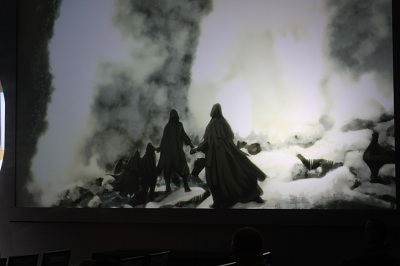 GamesBeat: I’m sure there are more people willing to make a bet on your team now.
GamesBeat: I’m sure there are more people willing to make a bet on your team now.
Chen: It’s a tremendous pressure. I didn’t expect Journey to see such an overwhelmingly positive reaction. I didn’t think I could make anything that could get 11 nominations here, for example. It’s been the turning point in my career. How am I supposed to make a game that’s even better? Journey is already about the ultimate life journey. That’s the pressure I’m under.
GamesBeat: Are you at the story-making stage, then? Are you working on a design?
Chen: We’re at that early phase where we try to figure out what kind of interactions can provide the feeling we want. Because of Flower and Journey, we have the arc. We know exactly how to go up and down through the moment. It’s more like, “What’s the core of it?” In Journey it’s the movement and the flying. We don’t have that quite yet. We’re still searching for it.
Sometimes it’s kind of scary. It’s already been eight months and we haven’t found it yet. That’s not a surprising thing if you look at Flower and Journey, but if you look at other companies, in eight months they’ve already finished a game. I’ve often felt guilty that I have all these things to play with, without making anything that’s profitable. Nothing’s easy. I almost don’t believe that anything easily made is any good.
GamesBeat: Are there other companies you’ve looked to for inspiration?
Chen: Right now I’m looking at Minecraft and Supercell. Everybody’s talking about those. I’ve become curious about how the hell they did this. I’ve been playing the Supercell games just to get an idea of what happened there. So far I don’t think have anything really positive to say. [Laughs]
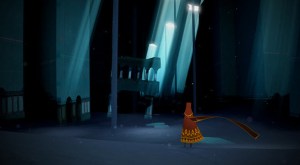 GamesBeat: It sounds like there is a winning formula in there that nobody else does. Uniqueness is what you guys have. Starting with the emotion seems to be a good way to figure things out.
GamesBeat: It sounds like there is a winning formula in there that nobody else does. Uniqueness is what you guys have. Starting with the emotion seems to be a good way to figure things out.
Chen: My New Year’s resolution is that I’ve been traveing since this last Christmas. I got to go to talks at various colleges and universities in China that have gaming programs. I did this in America and Europe before. What I see very consistently is that students come up after my talks asking if there’s any way they can work at our company. I say, “No, we’re very small.”
But the reason they ask is because, no matter what company they find, everybody’s focusing on how to get people more addicted to their games, how to keep them coming back, how to create monetization points. That’s not what they think games should be about. I think I’m somewhat responsible, because we’ve showed them that games can help people. There’s just no place for them to work.
The gamer knows that it’s possible to get these emotions from a game. Developers know that it’s possible to create games like this. What’s missing the guy with the money who wants to invest in them or publish them. They haven’t seen any major commercial success out of high-quality, emotional games, artistic games. Even though there’s all these passionate people who want to put their life into this, there’s no value in it.
So my resolution this year is: I’m not a money guy, but I want to make our next product a commercial success, so that people will say, “Hey, there’s a huge market out there. If you make a high-quality games that can touch people, it’s going to do great business.” Look at Pixar. Why doesn’t a company like that exist in the games industry? I want to make that commercial success. Even if it’s not me who ends up becoming that Pixar, someone will found it in the future.
GamesBeat: Mitch Lasky is very interesting in that respect. It seems like he might understand that more than most money people.
Chen: Yeah. It was Journey that brought Mitch into connection with me. He happened to play the game. If he hadn’t played it, I don’t think we would have ever found our way together. Journey, in a way, helped finance the company.
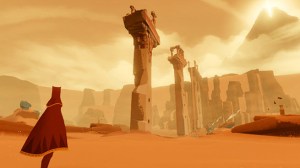 GamesBeat: You must have interesting conversations with him, about being practical or not. Monetization will matter at some point.
GamesBeat: You must have interesting conversations with him, about being practical or not. Monetization will matter at some point.
Chen: [Laughs] It’s interesting to juggle it. When I talk to the team, it has to be inspiring. If you just talk about money, they’re not excited. If I talk to investors or business guys, sometimes I have to switch to a different perspective. I think that in the last year, talking to various publishers and investors, I’ve finally gotten the idea of what they’re looking for. I can talk to them their way.
GamesBeat: There are some good things happening in the industry that should help you. The chance to go across platforms is there. If you don’t find a publisher, you can publish yourself.
Chen: Yeah. It was totally impossible in the past. The industry has changed so much. People are asking us about whether we think indie is mainstream now. We started this indie thing seven years ago. So much has changed.
GamesBeat: The multiplatform aspect has to make investors happier. That’s a good step to take. Reaching more people is probably a good thing.
Chen: One thing I believe as far as business is that a business’s true potential and value comes from how much service it can provide the world. If you look at Blizzard, they’ve always had the craft and the passion. Back in the day, they were making strategy games. They were for a hardcore market. All their games were genre leaders — Diablo, StarCraft — but they were never that financially successful. A friend of mine was there in the early days, and he was telling me that they didn’t even have air conditioning back when they were making StarCraft.
But when they started to make World of Warcraft, it was the same team, the same people, and the same process, except the game was serving more than just hardcore strategy players. There was role-playing. There was socializing. A lot of women started playing it. All of a sudden they became super-rich. It’s not as if they changed they way they did things. They just served a much bigger crowd.
For me, this is my business pitch. Our game is meant for average people to play, rather than just gamers. Our game doesn’t have language. It should reach a worldwide community. If our game can be delivered to that worldwide community, to everyone, why shouldn’t we make money? There has to be money there. When it comes to how we monetize it, there’s always a way.
VentureBeat's mission is to be a digital town square for technical decision-makers to gain knowledge about transformative enterprise technology and transact. Learn More

